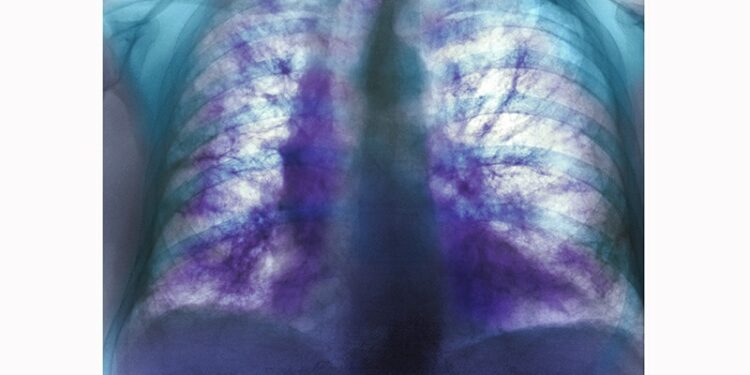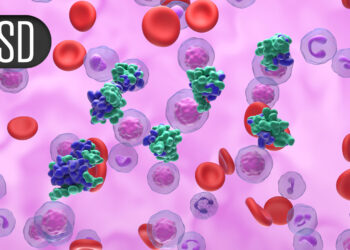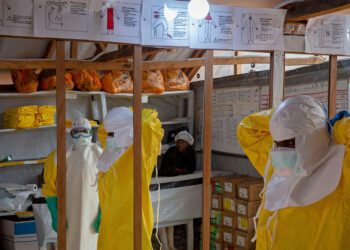TOPLINE:
In a phase 3 study, nerandomilast administered at 18 mg or 9 mg twice daily slowed the progression of pulmonary fibrosis in adults with progressive pulmonary fibrosis.
METHODOLOGY:
- In a previous study, nerandomilast, a preferential inhibitor of phosphodiesterase 4B, was found to slow the progression of idiopathic pulmonary fibrosis.
- The present phase 3, randomized trial conducted at multiple sites across 44 countries investigated the efficacy and safety of nerandomilast in patients with a confirmed diagnosis of interstitial lung diseases (ILDs) other than idiopathic pulmonary fibrosis.
- The study enrolled 1176 patients (mean age, 66.4 years; mean forced vital capacity [FVC], 70.1% of the predicted value) who were randomly assigned to receive either 18 mg or 9 mg nerandomilast or placebo twice daily.
- Patients were stratified on the basis of background nintedanib therapy and fibrotic patterns observed on high-resolution CT. The mean exposure duration was approximately 14.5 months in each group.
- The primary endpoint was the absolute change from baseline in FVC at week 52, and key secondary endpoints were time to first acute exacerbation of ILD, respiratory-related hospitalization, or death.
TAKEAWAY:
- Nerandomilast significantly reduced the decline in FVC compared with placebo, with adjusted differences of 67.2 mL for the 18 mg dose and 81.1 mL for the 9 mg dose (P < .001 for both). This reduction in lung function decline was sustained regardless of background therapy.
- The study could not confirm the less frequent occurrence of a first acute exacerbation of ILD, respiratory-related hospitalization, or death in the nerandomilast groups compared with the placebo group.
- Deaths occurred in a lower proportion of patients receiving nerandomilast at 18 mg (hazard ratio [HR], 0.48; 95% CI, 0.30-0.79), and 9 mg (HR, 0.60; 95% CI, 0.38-0.95) doses than in those receiving placebo.
- Diarrhea was the most frequently occurring adverse event, reported in 36.6%, 29.5%, and 24.7% patients in the 18 mg nerandomilast, 9 mg nerandomilast, and placebo groups, respectively. Adverse events leading to regimen interruption or permanent discontinuation occurred at similar rates across the groups.
IN PRACTICE:
“The FIBRONEER-ILD trial showed that nerandomilast at a dose of 18 mg twice daily or 9 mg twice daily slowed the progression of pulmonary fibrosis in patients with progressive pulmonary fibrosis,” the authors wrote.
“The current clinical trials represent a meaningful advancement in the treatment landscape for persons living with IPF [idiopathic pulmonary fibrosis] and progressive ILD other than IPF,” the author of an associated editorial wrote.
SOURCE:
This study was led by Toby M. Maher, MD, Department of Pulmonary, Critical Care, and Sleep Medicine, Keck School of Medicine, University of Southern California, Los Angeles. It was published online on May 19, 2025, in The New England Journal of Medicine.
LIMITATIONS:
The trial was not powered to evaluate nerandomilast in specific subgroups, including patients grouped by ILD diagnosis. Additionally, patients taking certain medications, particularly mycophenolate, that are commonly used in treating autoimmune diseases were excluded from the trial.
DISCLOSURES:
This study was funded by Boehringer Ingelheim. Nine authors declared being employees of Boehringer Ingelheim, while few declared serving as consultants. Some other authors reported having other financial ties with various pharmaceutical companies.
This article was created using several editorial tools, including AI, as part of the process. Human editors reviewed this content before publication.
Source link : https://www.medscape.com/viewarticle/nerandomilast-may-slow-down-progressive-pulmonary-fibrosis-2025a1000h69?src=rss
Author :
Publish date : 2025-06-26 12:59:00
Copyright for syndicated content belongs to the linked Source.









